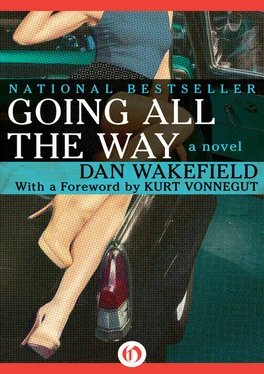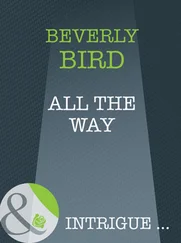“Let me freshen that.”
Mr. Pilcher was across the room and had the glass before Sonny could decide if it was the right thing to have a second, so he just settled back to enjoy it. Marty mainly talked to her father while Gunner looked on admiringly, and Sonny’s concentration floated pleasantly off as he enjoyed the voices, the pleasant tone and feeling of what was being said, without really hearing the words. The comfortable mood, the serenity of the room, was broken by a brittle voice that said curtly, “We’re late.”
In the door was a small, sharp-faced lady who was browned in that leathery way that comes to middle-aged women who are serious about their golf.
Mr. Pilcher stood up and said, “You know Mr. Casselman, dear; this is his friend Mr. Burns. My wife, Lilly.”
“Evening,” said Gunner, snapping to attention, and Sonny stood and said, “Pleased to meet you.”
Mrs. Pilcher gave each of the guys a quick glance, almost like a slap, and turned to Marty. “Just remember you have to be up early tomorrow,” she said.
“Yes, Mother.”
“Let’s go,” she said to Mr. Pilcher. He smiled, set down his drink, and came over to shake hands with Sonny and Gunner.
“It was pleasant to talk with you. I hope we’ll meet again.”
“Thank you, sir,” Sonny said.
“Great,” said Gunner. “See ya soon.”
Sonny was glad his parents weren’t home when Marty and Gunner dropped him off; he wanted to be alone and think. He went to his room to put on his favorite thinking record, The New World Symphony . It was the only symphony record he owned, and he guessed maybe he liked it because there was a popular song made out of the tune of one part of the symphony, a song called “Going Home,” which was sad and yet somehow sweet and nostalgic. The whole symphony reminded Sonny of wide open spaces, autumn campfires, and wild, strong rivers. America past and pure, still clean and uncluttered. He put on the record and lit a cigarette, thinking what a great guy Marty’s old man was, the great way he made you feel just talking to you. Sonny wondered if it was the thing people called “Old World charm,” and whether there was something Jewish about it, some quality they had. Most people thought of Jews as talking too loud and trying to Jew you down, out of your money, but Sonny had several professors who were Jewish and had that special aura of culture and grace that Mr. Pilcher had.
The only other person he knew who had that, though, wasn’t Jewish at all. It was Mrs. Hullen, the mother of a girl who Sonny had a real crush on when he was a sophomore at Shortley. Mrs. Hullen came from one of those families where everyone went to the fancy Eastern colleges and all of them had swanky jobs like being presidents of banks and Episcopal bishops and headmasters of expensive little schools, and she married a man from the same sort of clan who graduated from Harvard Law School and was a leading attorney. But Mrs. Hullen didn’t seem to Sonny like a snob; she had that way of treating you as a gentleman and so making you feel like one even when you only were a moldy sophomore in high school. She offered you tea and liked to have real conversations, talking about world events and books, not in a dry, schoolmarm way but so it was really interesting and fun, and her eyes were fantastically alive, as if taking everything in and getting a big kick out of it all. Sonny loved just seeing the way she sat in a chair, her back perfectly straight, without seeming stiff or uncomfortable, her hands resting in her lap, occasionally making a graceful gesture but never fidgeting. He could simply not imagine her ever crying or yelling at anyone or going to pieces, and yet she was a mother, with a son and two daughters. Mr. Hullen was polite enough, but he hardly ever said anything and seemed a little scary to Sonny. If it came to picking an All-Star parent team, Sonny would choose Mrs. Hullen and Mr. Pilcher. But that was something you couldn’t choose, at least for yourself. You took what you got and made the best of it. Or the worst of it.
Sonny went out taking pictures by himself the next day, feeling very proud and manly that he was getting off his ass and doing something constructive without anyone else’s help or urging or companionship. He went to a little playground about a half-mile from his house, nearer to the old neighborhood he’d grown up in. There was a wading pool and swings and teeter-totters, and Sonny really got a kick out of watching the kids and getting what he thought were some good shots. He stopped off and had a cherry Coke at Binkley’s Drugs on the way home, and came in hot and tired but feeling a nice satisfaction with himself. He even noticed a little stirring, an almost physical sense of the small, fluttery feeling of a kind of hope.
He walked in the den and found his mother wiping her eyes with a wet washcloth. Her face was pink and puffy.
“What’s the matter?” he asked.
“That woman,” Mrs. Burns said. “I am going to give that woman a piece of my mind.”
“ What woman?”
“Your friend’s mother. That Casselman woman.”
“What the hell are you talking about?”
“That woman had the nerve to call me and go on and on about you being a bad influence on him . Can you beat that? Her son is just perfect, of course. God’s gift to the universe. Innocent as a babe in arms. My foot, he is. I know what he is. And I know what he’s done to you .”
“For God sake, we’ve been all through that stuff. It’s none of your business.”
“Oh, I suppose it’s her business, though?”
“No, it’s not anyone’s business.”
“I’d have gone to see that woman long before this, except I knew you’d hate me even more.”
“ Please don’t say that stuff. I don’t hate you. I don’t hate anyone. Please don’t do something awful.”
“You see,” she started sobbing. “Whatever I do is awful.”
“I didn’t say that!”
“You think it. You think I’m awful. My only son. When you were a little boy you loved me so, and now you hate me.”
“Stop it!” Sonny shouted. “Stop saying that stuff or I’ll shoot myself! I swear to God I’ll find a gun and shoot myself!”
Mrs. Burns began screaming. Then great, horrible sobs came out of her, as if her insides were being wrenched out. Great spots were exploding in Sonny’s eyes, and he thought he was going to heave. He groped for the door and went outside, blinking as he propped one hand against a white square wooden pillar of the porch. He closed his eyes and tried to settle his mind.
Hi Diddle diddle
Cat with a fiddle
Cow jumped out into Noon
Little dog laughed to see the port
And the Prince ran away with a goon
He stood on the porch until he stopped shaking so bad and then went back inside. His mother was pressing the washcloth on her forehead, sniffling and breathing hard.
“I’m sorry,” she said.
“I’m sorry,” said Sonny. “Are you all right?”
“Yes.” She managed a little smile that looked like it hurt. “I’ve got to fix my face. I’ve got to see that woman at six o’clock.”
There wasn’t any way he could argue her out of it, so he insisted on going with her. He went upstairs and called Gunner from the little telephone alcove. Gunner had already talked to his own mother, and he sounded a hundred years old.
Mrs. Burns got all dolled up in a pink suit and matching pillbox hat. She looked like she was going to a PTA meeting. Maybe that’s sort of what it was, except the children were grown. All they needed was a teacher to chair the meeting.
Gunner greeted them at the door, wearing a fatigue camouflage suit he’d brought home from the Army. Sonny wished he had one too, even though he knew that kind of camouflage wasn’t going to help much. It was designed to keep you safe in jungles from enemy gooks, but it couldn’t protect you from wild mothers. Nina Casselman was arranged on the couch, wearing one of her slinky silk-blouse-and-toreador outfits and the backless white heels, one of them dangling from the toes of a crossed leg. Sonny felt a flush of excitement and looked away. It seemed like betraying his own mother to get sexed up by her enemy-mother. Mrs. Burns sat down in an armchair and Sonny stood beside her, as if taking up a required position.
Читать дальше












